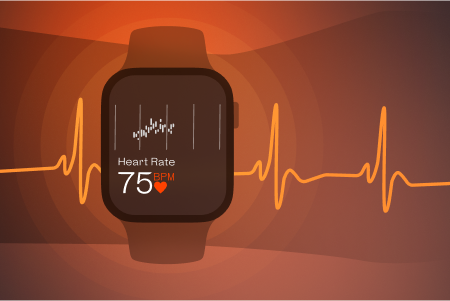


Welltory is the Ultimate HRV App




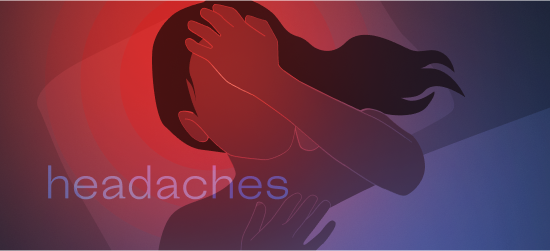
Can you believe that according to the World Health Organization, nearly half of all adults worldwide experience a headache in any given year? If you feel like no one understands how frustrating a headache can feel – trust us, a lot of people do! In fact, headaches are one of the most common reasons why people seek medical attention. In the United States alone, it is estimated that more than 39 million people suffer from migraines, and over 10 million people experience chronic daily headaches.
The causes of headaches can vary from stress and tension to underlying medical conditions such as brain tumors or infections. They can have a significant impact on a person’s quality of life, causing missed workdays, a fall in productivity, and decreased overall well-being. But what is a headache?
Different types of headaches can have distinct symptoms and characteristics. Understanding your headache symptoms can help you identify which type of headache you are experiencing.
If you are experiencing frequent or severe headaches, it is important to consult with a doctor to determine the type of headache and appropriate treatment options. Your healthcare provider may recommend keeping a headache diary to track your symptoms and identify triggers. This is when Welltory comes into play. While tracking your HRV, our users can tell the algorithm how they feel so it’s easier to track changes over time.
Going to bed for a nap or a night’s sleep might seem like a solution, however, that’s not where headaches end. Nighttime or nocturnal headaches, also known as nocturnal headaches, are another type of headache that occurs during sleep or upon waking up from sleep and can interrupt a person’s sleep patterns. It is not the same as morning headaches which can occur at any time during the morning and can be related to a variety of causes.
Nighttime headaches can be caused by several factors, including sleep disorders such as sleep apnea or restless leg syndrome, medication overuse, hypnic headaches, and cluster headaches. These are the most common types of nighttime headaches:
Hypnic headaches are rare and typically occur in people over the age of 50. They cause severe, throbbing pain on one or both sides of the head and typically wake people up from sleep. It is believed that one in three people with hypnic headache experience severe headache attacks. It also has been named the clockwise headache or alarm clock headache and is considered a primary headache.
The exact cause of hypnic headaches is not well understood, but researchers believe that they may be related to changes in the brain and nervous system during sleep, melatonin production, or REM sleep. Hypnic headaches are thought to be a primary headache disorder, which means they are not caused by an underlying medical condition. Certain factors may trigger or worsen hypnic headaches, including sleep disturbances, caffeine intake, and changes in sleep patterns. Some people may experience hypnic headaches during certain stages of sleep, such as during the transition from REM sleep to non-REM sleep.
Sleep apnea is a condition in which a person’s breathing repeatedly stops and starts during sleep. This can cause oxygen levels in the blood to drop, leading to headaches. They are often described as a dull, throbbing pain that feels like a tight band around the head. These headaches can also be accompanied by other symptoms such as fatigue, irritability, and difficulty concentrating. If it sounds familiar we recommend to start tracking your sleep and consult with a doctor. There are also other sleep disorders, such as restless leg syndrome or periodic limb movement disorder, which can also cause nighttime headaches. It’s important to know how you sleep to prevent headaches and other symptoms of disturbed sleep.
Get Welltory
for better sleep
Get Welltory
for better sleep
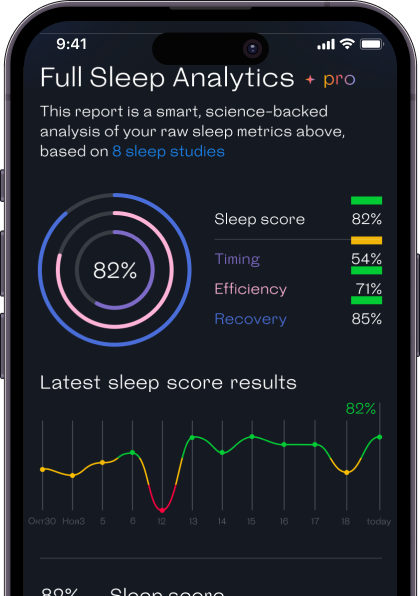
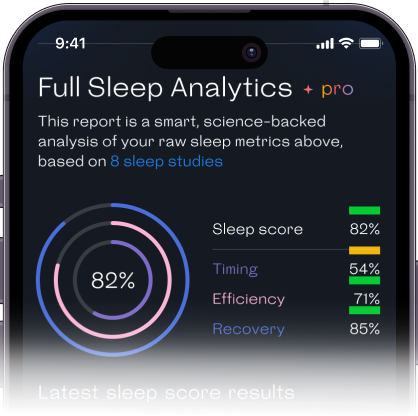

Cluster headaches are a type of primary headache disorder that is characterized by severe, recurring headaches that occur in cyclical patterns. These headaches can occur at any time of day, but they are sometimes referred to as “alarm clock headaches” because they often awaken the person from sleep, particularly during the night. The nighttime cluster headache is a subtype of cluster headache that occurs exclusively during sleep or upon waking up from sleep.
The exact cause of cluster headaches is not well understood, but they are believed to be related to abnormalities in the hypothalamus, a part of the brain that regulates the body’s natural rhythms. Certain triggers, such as alcohol consumption, changes in sleep patterns, and exposure to high altitudes or certain medications, can also provoke cluster headaches. The symptoms may include severe pain on one side of the head, eye tearing or redness, nasal congestion, and restlessness or agitation.
Tension headaches are the most common type of headache and are typically described as a dull ache or pressure around the forehead or temples. They are often triggered by stress, anxiety, or muscle tension in the neck and shoulders.
Migraines are severe headaches that cause throbbing or pulsating pain on one side of the head, often accompanied by nausea, vomiting, and sensitivity to light and sound. Nighttime migraines are less common than daytime migraines and may be more severe and longer lasting. People with nighttime migraines may also be more likely to experience sleep disturbances, such as difficulty falling or staying asleep. Moreover, nighttime migraines may be associated with certain triggers that are more common at night, such as changes in sleeping patterns or low blood sugar levels.
As you can see from these brief descriptions of nighttime headaches, the association between headaches and sleep problems is bidirectional. Sleep disturbances and headache disorders share common brain structures and pathogenic mechanisms. Tension-type headaches (TTH), migraine, and sleep disturbances often occur together. A 2018 research suggests that 50% of individuals who have either TTH or migraine also have insomnia. There is a correlation between insomnia, poor sleep quality, and an increased frequency and intensity of headache attacks.
Modifiable causes can be easily modified or eliminated by making certain changes to lifestyle or habits. Challenging to modify causes are not easily modifiable and may require more specialized interventions or medical attention.
As you can see from these brief descriptions of nighttime headaches, the association between headaches and sleep problems is bidirectional. Sleep disturbances and headache disorders share common brain structures and pathogenic mechanisms. Tension-type headaches (TTH), migraine, and sleep disturbances often occur together. A 2018 research suggests that 50% of individuals who have either TTH or migraine also have insomnia. There is a correlation between insomnia, poor sleep quality, and an increased frequency and intensity of headache attacks.
Modifiable Causes of Nighttime Headaches | Challenging to Modify Causes of Nighttime Headaches |
Poor sleep hygiene | Sleep apnea |
Food and drink intake | Poor posture |
Medication | Hypertension |
Screen time before bed | Bruxism (teeth grinding) |
Stress and anxiety |
Lack of sleep or poor sleep quality can cause headaches due to changes in the levels of certain neurotransmitters and hormones in the brain. As you can see from the description of the most common types of nighttime headaches, there is a strong link between sleep and headaches. Building a healthy sleeping routine is essential and you can get help from Welltory. Find out how can you track your sleep and get valuable insights using Welltory here.
Certain medications, such as blood pressure medications or antidepressants, can cause nocturnal headaches as a side effect. Speaking to your doctor and finding alternative medication can help with headaches.
The blue light emitted by electronic devices such as smartphones, tablets, and computers can suppress the production of melatonin, a hormone that helps regulate the sleep-wake cycle. This disruption of the sleep-wake cycle can cause headaches, especially in people who are prone to them.
In addition to the impact on melatonin production, excessive screen time before bed can also cause eye strain, fatigue, and muscle tension, which can contribute to headaches. Moreover, the posture and position of the body during screen time can also cause muscle tension and strain in the neck and shoulders, leading to headaches. And this is harder to fix!
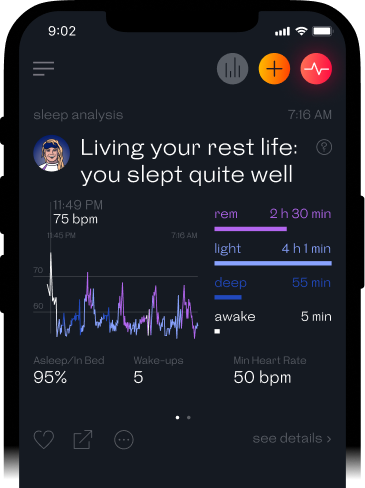
Treatment for sleep apnea can help reduce the frequency and severity of nighttime headaches. Continuous positive airway pressure (CPAP) therapy is the most common treatment for sleep apnea and involves wearing a mask over the nose and/or mouth during sleep to deliver continuous air pressure to keep the airway open. Other treatments for sleep apnea include oral appliances, positional therapy, and surgery.
Poor posture can cause tension in the neck and shoulders, which can lead to tension-type headaches. This is particularly true for individuals who spend long periods of time sitting at a desk or looking down at a phone or computer screen. Maintaining good posture and taking frequent breaks to stretch and move can help reduce the risk of posture-related headaches. Additionally, seeing a physical therapist or chiropractor may help correct underlying posture issues that contribute to headaches.
Hypertension or high blood pressure can cause nighttime headaches. This is because high blood pressure can cause the blood vessels in the brain to constrict or narrow, which can lead to headache pain. Additionally, hypertension can also increase the risk of other conditions such as stroke, which can cause headache pain as well. By identifying the underlying cause of your headaches, you may be able to take steps to prevent them from occurring in the first place. Maintaining a healthy lifestyle, including staying hydrated, getting enough sleep, and managing stress levels, can help reduce the frequency and severity of headaches.
Teeth grinding, also known as bruxism, can cause headaches due to the increased tension and strain it places on the muscles of the jaw, head, and neck. When a person grinds their teeth, the constant clenching and grinding motion can cause inflammation and muscle fatigue, which can then lead to pain and discomfort in the surrounding areas. There are claims that the odds of having a headache are higher among individuals with sleep bruxism than those without.
Additionally, teeth grinding can also lead to temporomandibular joint (TMJ) disorder, which is a condition that affects the joints and muscles of the jaw. TMJ disorder can cause a range of symptoms, including headaches, facial pain, jaw pain, and difficulty opening or closing the mouth. It is important to address teeth grinding as a potential cause of headaches and seek appropriate treatment, such as mouthguards or relaxation techniques, to alleviate the associated pain and discomfort.
Stress and anxiety are common triggers for headache pain, particularly tension-type headaches, and migraines. When stressed, the body releases stress hormones that can cause muscle tension and inflammation, leading to headache pain. Anxiety can also cause changes in neurotransmitters and blood flow, which can trigger or worsen headaches. Learning stress-reduction techniques, such as meditation or deep breathing, may help reduce the frequency and intensity of stress-related headaches. You can learn how stress affects your body and how we can help here.
In addition to treating the underlying cause, as you can see, lifestyle changes may help to reduce the frequency of nighttime headaches. Monitor your health with Welltory measurements and migraine diaries, like Migraine Diary or Migraine Buddy to clarify the causes of your headache. This will help you find correlations between attacks and levels of stress and energy, sleep quality, and nutrition, and determine what exactly causes a headache.
Welltory Team, 6 June. 2023
 App Store
App Store
 Google Play
Google Play
 Huawei AppGallery
Huawei AppGallery
 Galaxy Store
Galaxy Store

